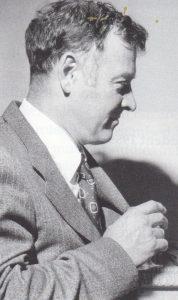
The death of Professor Oliver Wrong has deprived patients – and medical science – of a leader. He excelled at sorting out relevant details from the mass of data which patients present. By his intelligence and careful observation he rapidly found the wood among the trees.
His interest was what makes the human body work and how it fails in disease. His work led to greatly improved diagnosis and treatment of conditions ranging from disabling childhood bone diseases to how kidneys might fail in middle age.
His main medical interest was acidosis and what happens when it gets out of control in humans. Acidosis is the production of acid, and if normal metabolism and organ function is not present this process will poison the body. The group of kidney diseases causing this condition, is relatively rare – but like so many rare diseases has taught us an enormous amount about how the body normally works.
In 1959, as a young physician, Wrong invented the first test for measuring one of the forms of acidosis in humans, that due to a type of unusual kidney disease. The test he devised is used to determine the particular type of kidney disease and the optimum treatment and 50 years later remains the best test for this disease, while his original publication describing its invention is still fresh and exciting.
Years later he discovered that one form of kidney disease, believed by others to be another form of kidney acidosis, was rather different. He named the new syndrome Dent Disease after his close colleague and mentor at University College Hospital, Charles Dent. in one of whose patients he found the disease. This led to the discovery of another “new” syndrome and it is likely that similar diseases based on Wrong’s insights will be discovered. His work allowed the diagnosis and care of these patients to be rational; the treatments he introduced, for example, have either prevented or made much less disabling a number of childhood bone diseases related to the kidney.
Oliver Wrong was born in 1925 to a highly intellectual family with strong roots in Oxford University. His father, a Canadian, was a senior academic at Magdalen. Relations included a stellar array of scientists, writers and politicians. His undergraduate training was at Oxford, with clinical work at the Radcliffe Infirmary.
After National Service in the Far East he returned to Oxford then studied in Toronto and at the Massachusetts General Hospital in Boston. His time in Boston was formative: he further developed his interests in acidosis and the related areas of salt and water metabolism. We have only appreciated these fundamentals of how the body works due to individuals such as Wrong.
After returning to England Wrong worked at Manchester and at the Hammersmith Hospital and was then appointed to a Chair in Medicine at Dundee in 1969. He moved to University College Hospital, London in 1972 to become Director of Medicine; this was his academic home until his death.
Throughout he had a happy partnership with his wife Marilda, whom he met on a touring holiday in Europe. They had three daughters; as part of his research even the family were subjects. It is rumoured that breakfast at home in the 1960s might have included small bags of salt solution. These would be recovered from the motions and analysed to determine the role of the gut in salt and water metabolism. Not for nothing did Wrong describe the stool as a “Cinderella” of salt and water metabolism. To this day many physicians do not fully understand the role of the gut in salt and water metabolism.
Wrong hated medical politics and even as Director of Medicine at UCH he sometimes found relations with his less academic colleagues quite difficult. He was a staunch supporter of the NHS. “Retirement” in 1990 meant freedom, and Wrong’s work blossomed away from medical administration.
Wrong’s work spanned the change in medicine from classification of disease based on clinical observation and measurements of physiology and biochemistry, to the application of molecular genetics. Though we still only dimly understand the role of genetics in many common disorders, certain rare conditions have provided tantalising clues as to the cause of common diseases. With his co-workers, including Raj Thakker and Steve Scheinman, Wrong made the discoveries necessary for the advent of modern molecular genetics.
In the driven world of modern academic medicine he had a calming influence anchored in his intellectual mastery of the subject. He also knew the patients and he cared for them. On his deathbed he dictated the revisions to his final publication, devoted to a rare form of kidney acidosis found in the Tropics, a line of work was stimulated by his time in Singapore and Malaysia on National Service.
Numerous physicians are thankful to Oliver Wrong for his intellectualand practical support. This wentfurther than his speciality of kidney disease; he had the skill of seeing beyond any single body-system, and he combined an enquiring scientific mind with humanity.
Oliver Murray Wrong, physician: born 7 February 1925; Professor of Medicine, University College London 1972-90, then Emeritus; married 1956 Marilda Musacchio (two daughters, and one daughter deceased); died 24 February 2012.
© Independent Newspaper
© Times Newspapers Ltd
Kidney International (2012); 82 (2):121–122. © Nature Publishing Group